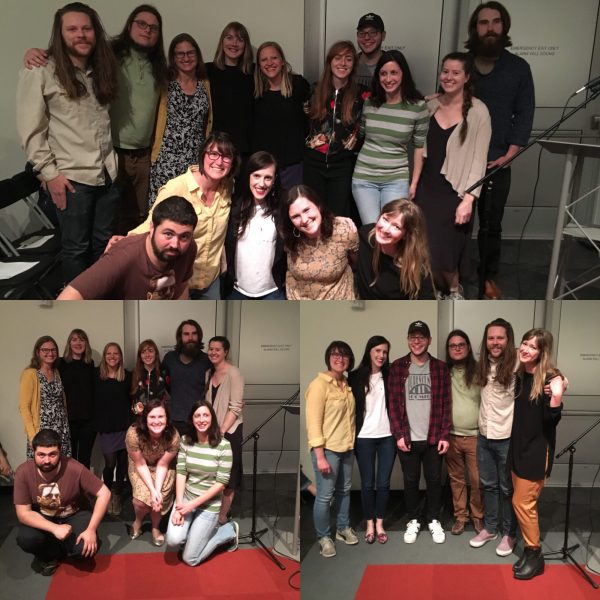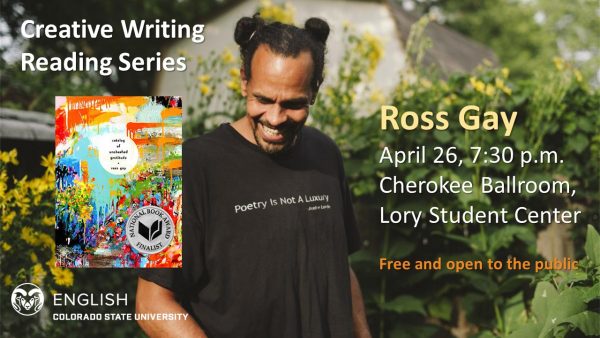~from Michaela Hayes

The last MFA Thesis reading of the semester was a magical night indeed. Only two readers took the floor — fiction writer Cory Cotten-Potter and poet Cole Konopka. Before the festivities began, Camille Dungy introduced the night (as always, thank you Camille) and the graduating class of MFA writers lined up for photos. Soon, Judy Doenges was at the mic introducing Cory Cotten-Potter.
Doenges began her introduction by discussing Cotten-Potter’s enigmatic nature. She told the audience about his seeming unwillingness to discuss his past or give her a straight answer about anything and about the litany of bizarre jobs he once held which led him to where he is today, revealed to her gradually, like the slow drip of a hamster’s water bottle. If this were meant to intrigue the audience, it worked.
Cotten-Potter then took the stage, thanked the people in his life, and began his magic. Or, in his words, “Alright now on to the fun stuff. Actually, it’s kind of a depressing story, so not that fun.” It was depressing, but I found it fun as well. The two aren’t always mutually exclusive.
The story took place on a farm outside a small town in Colorado and centered around the main character Lucas. The narrative began five months after Lucas had bought the farm. The plot was ambling and shifted between Lucas’s life prior to buying the farm and the present time. Lucas had moved to the small town with his wife Monica, a woman he had met 18 months prior. Monica had left him some time before, and he now sends her a letter every week describing the different ways that he is renovating the farm, which he insists is “very important work!”
Watching Cotten-Potter read was like watching a cosmetologist weave a complicated braid. I sat in awe as he interlaced dry, dry, dry humor (I feared I may pee myself from laughter several times), magical realism, raw emotion, and linguistic capability into one complete work.
Sasha Steensen introduced the next reader, Cole Konopka. She described him as “intelligent and curious.” His poetry has the paradoxical gift of being both comforting to the reader in its brutal honesty, while still inflicting a level of discomfort stemming from that same honesty. She framed her introduction around the fact that his last name means “one who sings.” She shared her theory with the audience that Konopka had inherited his poetic abilities from some primordial ancestor and through his poetry he sings our world back to us.
Konopka read with a deep and full voice. Each sonnet was titled with a single letter, which he joked was not due to artistry but to laziness. What he read was experimental in a playful way and infused with hints of humor. He relied more on prosody than rhyme, creating a song for the reader without the need for lullaby.
Konopka shared the stories behind a few of his poems. One poem tapped into one of the main dilemmas of nature writing: to what degree as writers are we allowed to anthropomorphize nature? The poem is about getting drunk and climbing a tree, (he insisted he did not get drunk and climb a tree). He discussed the difference between himself and the tree, and that he couldn’t find the tree’s heart –“We are separate kingdoms.”
The theme of the night was “light,” appearing in the work of both the writers. It felt appropriate for the last MFA reading of the series, as the graduates go on to shine their light and sing their songs.
Join us for our next reading!
